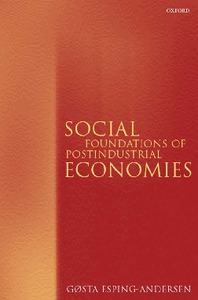Social foundations of postindustrial economies
"The Golden Age of post‐war capitalism has been eclipsed, and with it seemingly also the possibility of harmonizing equality and welfare with efficiency and jobs. Most analyses believe that the emerging post‐industrial society is overdetermined by massive, convergent forces, such as tertiarizat...
| Main Author: | |
|---|---|
| Institution: | ETUI-European Trade Union Institute |
| Format: | TEXT |
| Language: | English |
| Published: |
New York
1999
Oxford University Press |
| Subjects: | |
| Online Access: | https://www.labourline.org/KENTIKA-19200126124910283089-Social-foundations-of-postindu.htm |
| Summary: | "The Golden Age of post‐war capitalism has been eclipsed, and with it seemingly also the possibility of harmonizing equality and welfare with efficiency and jobs. Most analyses believe that the emerging post‐industrial society is overdetermined by massive, convergent forces, such as tertiarization, new technologies, or globalization, all conspiring to make welfare states unsustainable in the future. This book takes a second, more sociological and institutional look at the driving forces of economic transformation. What stands out as a result is that there is post‐industrial diversity rather than convergence. Macroscopic, global trends are undoubtedly powerful, yet their influence is easily rivalled by domestic institutional traditions, by the kind of welfare regime that, some generations ago, was put in place. It is, however, especially the family economy that holds the key as to what kind of post‐industrial model will emerge, and to how evolving trade‐offs will be managed. Twentieth‐century economic analysis depended on a set of sociological assumptions that now are invalid. Hence, to grasp better what drives today's economy, it is necessary to begin with its social foundations. After an Introduction, the book is arranged in three parts: I, Varieties of Welfare Capitalism (four chapters); II, The New Political Economy (two chapters); and III, Welfare Capitalism Recast? (two chapters)." |
|---|---|
| Physical Description: | 207 p. Digital Paper |

